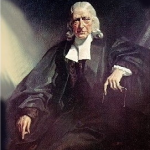Grace Can Do What Legalism Can’t
 “For God has done what the law, weakened by the flesh, could not do: by sending his own Son in the likeness of sinful flesh, and to deal with sin, he condemned sin in the flesh, so that the just requirement of the law might be fulfilled in us, who walk not according to the flesh but according to the Spirit.” (Romans 8:3-4 NRSV.)
“For God has done what the law, weakened by the flesh, could not do: by sending his own Son in the likeness of sinful flesh, and to deal with sin, he condemned sin in the flesh, so that the just requirement of the law might be fulfilled in us, who walk not according to the flesh but according to the Spirit.” (Romans 8:3-4 NRSV.)
These are remarkable words. Lying behind them are the frustrations of the apostle Paul’s religious life. His religion had once been a religion of Law. He had sincerely sought to please God through his own righteous efforts. But, the whole effort had ended in frustration and failure. Thus, he writes: “For we know that the law is spiritual; but I am of the flesh, sold into slavery under sin. I do not understand my own actions. For I do not do what I want, but I do the very thing I hate. Now if I do what I do not want, I agree that the law is good. But in fact it is no longer I that do it, but sin that dwells within me. For I know that nothing good dwells within me, that is, in my flesh. I can will what is right, but I cannot do it. For I do not do the good I want, but the evil I do not want is what I do.” (Romans 7:14-19 NRSV.)
The way of religious discipline had failed him. The way of strictness did not bring freedom & hope – it brought a life of contradiction. The way of religious attainments was not satisfying.
 Not only that, but the way of strict and demanding religiosity can lead to self-righteousness and judgmentalism. And, this itself is sinful. It is the offensive cry of the Pharisee in Jesus parable: “Two men went up to the temple to pray, one a Pharisee and the other a tax collector. The Pharisee, standing by himself, was praying thus, ‘God, I thank you that I am not like other people: thieves, rogues, adulterers, or even like this tax collector.’” (Luke 18:10-11 NRSV.) We are here on earth to live lives of love and devotion. We are here to serve God and others – not to be the judge of others.
Not only that, but the way of strict and demanding religiosity can lead to self-righteousness and judgmentalism. And, this itself is sinful. It is the offensive cry of the Pharisee in Jesus parable: “Two men went up to the temple to pray, one a Pharisee and the other a tax collector. The Pharisee, standing by himself, was praying thus, ‘God, I thank you that I am not like other people: thieves, rogues, adulterers, or even like this tax collector.’” (Luke 18:10-11 NRSV.) We are here on earth to live lives of love and devotion. We are here to serve God and others – not to be the judge of others.
Paul’s religion had been strict and demanding. And, he took pride in it. But, it had not brought him peace. Rather, it had brought guilt and shame and uncertainty. For how can a people ever know if they are good enough? How can we ever know if we have done enough? We become vividly aware of our own moral failures – and the failures of others. (See Philippians 3.)
Sometimes people try to “turn over a new leaf” — but they more often fail than succeed. There is a long-standing tradition of preparing for the New Year by making what we call “New Years Resolutions.” I don’t know how many people do that anymore and I don’t know how successful they are with it either. But, such Resolutions are often not kept. We find isn’t not so easy to “turn over a new leaf” – in spite of our best efforts.
The external Law of God can become a burden to us. How we need to have our person-hood and creativity unlocked and set free. How we need a law of life and freedom and holiness, not written upon tablets of stone or pages in a book – but upon our inward character! How we need a reason and a purpose and a direction by which to live!
This strange religious frustration is at the heart of the story of the beginnings of the Methodist movement, as well. John Wesley, as a young student at Oxford had committed himself to a strict discipline by which he sought to give his whole life and heart to God. But, this sincere religious quest had also ended in failure. His great missionary endeavors to America led to failure. He wrote: “I went to America, to convert the Indians; but O! who shall convert me? who, what is he that will deliver me from this evil heart of unbelief?”
It is the message of salvation through faith that brings freedom, hope and life. This is what Paul and Luther and Wesley found. This is their witness to us. The way of Christ is the way to hope and freedom.
What religious disciplines, in and of themselves, cannot do, God has done for us in Jesus Christ. Through Jesus Christ the way of faith and salvation have been opened up for us – a way that focuses our attention, not on ourselves but on our Savior. Jesus Christ is our reconciliation with God. It is the sacrifice of His life that becomes the source of our hope and freedom and holiness. No human being, through his or her own knowledge or moral attainments, could forge such a link between a holy God and us. No. Rather: “God was in Christ reconciling the world to Himself, not counting their trespasses against them, and [God] has committed to us the word of reconciliation.” (2 Corinthians 5:19 NASB.) In Jesus Christ there is peace, freedom, forgiveness and new life.
 Again, hear the apostle’s witness: “…I myself might have confidence even in the flesh. If anyone else has a mind to put confidence in the flesh, I far more: circumcised the eighth day, of the nation of Israel, of the tribe of Benjamin, a Hebrew of Hebrews; as to the Law, a Pharisee; as to zeal, a persecutor of the church; as to the righteousness which is in the Law, found blameless. But whatever things were gain to me, those things I have counted as loss for the sake of Christ. More than that, I count all things to be loss in view of the surpassing value of knowing Christ Jesus my Lord, for whom I have suffered the loss of all things, and count them but rubbish in order that I may gain Christ, and may be found in Him, not having a righteousness of my own derived from the Law, but that which is through faith in Christ, the righteousness which comes from God on the basis of faith….” (Philippians 3:4-9 NASB.)
Again, hear the apostle’s witness: “…I myself might have confidence even in the flesh. If anyone else has a mind to put confidence in the flesh, I far more: circumcised the eighth day, of the nation of Israel, of the tribe of Benjamin, a Hebrew of Hebrews; as to the Law, a Pharisee; as to zeal, a persecutor of the church; as to the righteousness which is in the Law, found blameless. But whatever things were gain to me, those things I have counted as loss for the sake of Christ. More than that, I count all things to be loss in view of the surpassing value of knowing Christ Jesus my Lord, for whom I have suffered the loss of all things, and count them but rubbish in order that I may gain Christ, and may be found in Him, not having a righteousness of my own derived from the Law, but that which is through faith in Christ, the righteousness which comes from God on the basis of faith….” (Philippians 3:4-9 NASB.)
It is by following Christ in the way of faith that we truly come to fulfill God’s Law – God’s true design and will for us. Through Faith the intent of the Law is fulfilled. By the inspiration and guidance of God’s Spirit, we serve not by an external constraint, but by an inner motivation. By faith the creative Spirit of God moves upon our lives: leading, guiding, motivating, empowering, cleansing, inspiring.
We need more than a list of good resolutions (not that that’s really a bad thing). We need more than a desire to turn over a new leaf — though that is a good thing, too. We need faith in a God who is always able to renew and transform us by grace. Let’s trust in a God who can make more of our lives than we ever could ourselves. “And all of us, with unveiled faces, seeing the glory of the Lord as though reflected in a mirror, are being transformed into the same image from one degree of glory to another; for this comes from the Lord, the Spirit.” (2 Corinthians 3:18 NRSV.)










But so many people who criticize me for supporting a disciplined lifestyle pray loudly about how they are happy they aren’t like me.
And, that’s disturbing. The issue is where discipline fits in the scheme of Christian living. There is all the difference in the world between discipline as a way of salvation — earning a standing before God — and discipline as an expression of our love for God & our desire to serve God more fully. “The law of the LORD is perfect, reviving the soul; the decrees of the LORD are sure, making wise the simple; the precepts of the LORD are right, rejoicing the heart; the commandment of the LORD is clear, enlightening the eyes; the fear of the LORD is pure, enduring forever; the ordinances of the LORD are true and righteous altogether. More to be desired are they than gold, even much fine gold; sweeter also than honey,and drippings of the honeycomb. Moreover by them is your servant warned; in keeping them there is great reward.” (Psalm 119:7-11 NRSV.) Strictness with regard to our selves can be an expression of lived out heart-devotion to God. Whereas, strictness as applied to others is likely to be just judgmentalism. I believe this is what Wesley was talking about when he said that the Law (of God) was established by faith (and I would add: by love).
Of course, the spark that ignited the fire that resulted in the Weslyan revival in England and America was Wesley’s heart realization that Jesus died even for John, and that none of Wesley’s incredible effort could win him favor with God. But where would we be without John Wesley’s almost superhuman self-discipline and focus. He changed the world not because of his experience of the power of the Risen Jesus, but because he had put into practice those disciplines that made him a perfect vessel for the pouring out of God’s redemptive power!!
Jim Lung